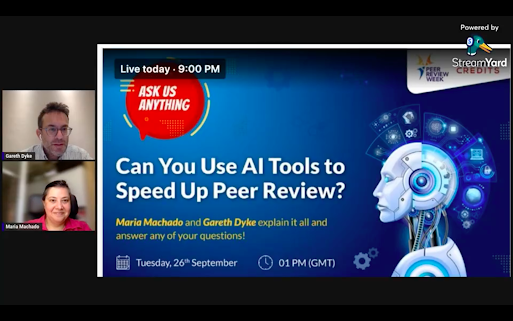How to become a good reviewer
How was it for you? I'm tired, but I liked it... 😳
Listen... I made an effort! I really wanted this to come to the world fully formed yesterday...
It didn't happen. Too much information and "zooms" make me groggy...
So, here we are. End of #PeerReviewWeek2023. My first full one.
How was it for you? I'm tired, but I liked it...
I promised a post a day, so I'm due one. This one. I want to tell you all about how I do this thing. Peer review is not an art form. It's work. We can break it down into a process.
How do you become a good peer reviewer?
Not to brag, but already doing it, I'm quite good 😎 (did you see this?)
Here are some top tips:
- Read.
In your area, in areas adjacent, sometimes in completely unrelated ones.
It's good to be aware of different styles and conventions, as they all have features we can learn from.
Reading keeps you up to speed with the latest developments in your field, and it is a good habit to maintain if you want to continuously develop your style.
- Take notes.
As good as you may be, you don't know it all. Nobody does.
This is especially true if going through texts describing new research. There is always something that you can learn: a reference paper you were not aware of, the application of a known technique that intrigued you, a different way to present the data.
- Praise the good.
There is always something. Find it.
The authors spent a long time thinking about the paper in front of you, structuring the study, conducting literature review, gathering data, analysing it, writing it up.
Acknowledge the effort.
- Point out the errors.
Reading a peer review report is a learning opportunity for the authors.
Grab your teacher's hat. Be pedagogical. This is maybe the first time these ideas have been made public.
Be constructive: what could be done differently to improve the study or the writing? If there is a fundamental flaw in reasoning, state this. But never get into personal judgements.
- Be aware of your own biases.
You are human. The authors are human. Even AI has biases...
Just keep yourself in check. Be fair. Be transparent if any conflict of interest arises. A reviewer is in a priviledged position. Keep the integrity of the process.
- Be clear.
Your goal is to communicate your thoughts on someone else's work and writing. Your suggestions could lead to improvements in the work and help to advance knowledge. Structure helps in doing this. Define key priorities and differentiate between "must have" and "would be nice to include".
If you are starting out in your academic career and would like some feedback on your writing, get in touch.
If you have been asked to review a paper by your supervisor and don't know where to start, email me.
If you're reading a paper and have no idea whether it's good or bad, whether to trust the findings it describes or not, I'm here to help.
This is what I do. It's the job I excel at.
And I can teach you the ropes.
Discover Storytelling for Science!





Comments
Post a Comment